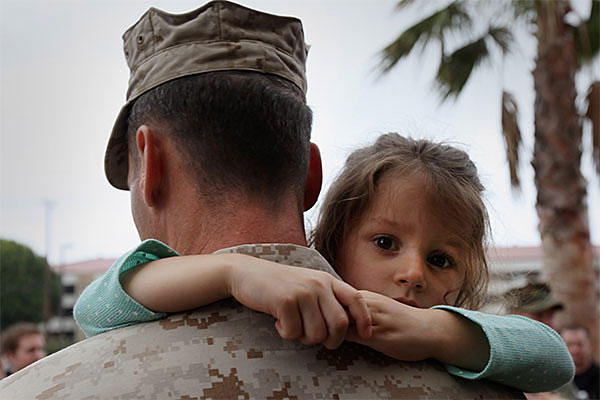Overview
Tips for helping a child cope with the deployment of a parent.
Children may find it very difficult to adjust to the absence of a parent who is called to duty. Some children may not understand why a parent has to leave, while others may be afraid for their parent's safety. Some children may even be angry with a parent for leaving. It's important to keep talking to your child and watching how he is handling the separation.
Talking with a child about deployment
When talking to a child about a parent's deployment, you can
- Help your child understand that she has not done anything wrong . Young children may think a parent is leaving because of something they've done. Try to explain that serving in the military -- and going away from time to time -- is her parent's job, just as going to the factory or office every day is what other parents do for work.
- Talk about where his parent will be and what he or she will be doing . Post a map where the child can see it. Spend some time together learning about where the parent is serving. If it's on a carrier, read a book about carriers, or if the deployed parent has gone to another country, learn something about its customs or language. Being familiar with and talking about the deployed parent's daily routines and getting a better picture of where he or she is can help your child cope with the separation.
- Be as honest and give as much information as possible . The child may have many questions about the military, and why her parent has to leave or whether he or she is safe. It's important to give her as much information as possible in words that she will understand.
- Make sure she doesn't feel like she has been abandoned . Telling the child that her parent is "on assignment" or "at work" may help her understand the separation and that this is a normal part of military life.
- Encourage your child to talk about his feelings . Let him know that it's OK to admit that he misses his parent or feels lonely.
- Help your child find ways to feel better when she's missing her parent. This could be by listening to a tape recording of her parent reading a story, looking at pictures of her missing parent, or even just talking about where he or she is.
- Talk about the deployed parent frequently . Tell stories or jokes, or even say things like, "This is the sweater Daddy gave me for my birthday," or "Mom loves spaghetti, let's have that for dinner tonight." Talking about the parent will help keep his or her presence in the child's life.
- Tell the child how much the missing parent loves and misses her . Sometimes children need to hear reassuring things over and over again -- remind the child of this as often as possible.
Different children may cope differently with deployment. Some children may react by trying to "bend the rules" when one parent is away, while others may have trouble sleeping or feel lonely. Pay attention to the child's behavior and look for any changes that may indicate he needs some help coping.
Maintaining routines
Children thrive on routines and consistency, especially during a difficult time like a deployment. Try to stick with your regular routines as much as possible during the deployment period. Here are some ways to do that:
- Be consistent with discipline. Don't change your "house rules" just because you're managing as a single parent. It's important for children to understand that even though things have changed, they can still count on the rules that you have established staying the same.
- Try to give your child a sense of stability. Try to maintain the same daily and weekly routines. You may also want to establish some new routines or rituals, such as spending a few minutes at bedtime talking about the deployed parent or looking at family pictures.
More tips for helping children cope with deployment
- Involve the child in writing letters or e-mails or making things to send to his parent. Also encourage the deployed parent to send individual letters to the child.
- If it's possible, find a way to count down the time until the parent returns in a way that the child will understand . Some families make calendars, while others may fill a big jar with a sticker or candy for each day until the family member returns. There may be some situations in which you may not have an exact date of return or the deployment is extended. If that's the case, you could make a paper chain and add a link for each day that the parent is gone, then use the chain as a decoration when they return.
- Plan special outings or activities. A trip to the movies, a visit to the grandparents, or even a bike ride together may help a child feel better. You may also want to plan events with children from other families that are coping with deployment.
- Limit television watching, especially of military action . Watching media coverage of conflicts or wars -- even ones that the parent is not involved in -- can be emotionally draining. If your child is interested in watching television coverage of military action, try to do it together so that you can monitor what the child is seeing, answer questions, and offer reassurance.
- Make sure your child's teacher is aware of the deployment . If your child's teacher is informed of the situation, he or she may be able to understand and cope with any behavior changes your child might have.





















